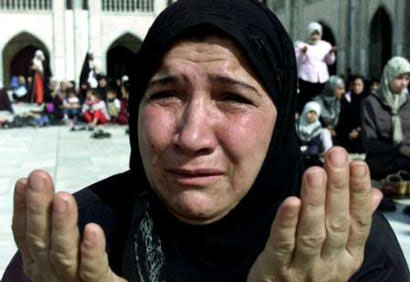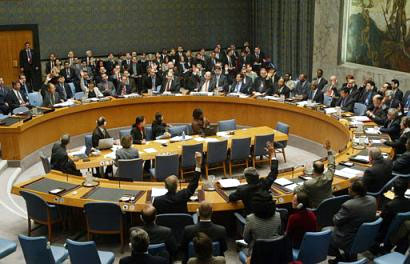
Women pray for peace in Baghdad during the first Friday of Ramadan. Reuters photo by Akram Salah
Does the world really need a war in Iraq?
| Why attack
Iraq?
Surely no one will deny the tyranny of the current dictatorship in Baghdad, a proven user of chemical weapons against its own people, a warmonger amongst its neighbors, and yet another case of a corrupt ruling family that plunders its nation. The dictatorship, regrettably one of many throughout the world, is currently contained via economic sanctions and military patrol. Since 1992, Iraq is constantly checked by American and British warplanes for any repeated aggression against the Kurds in the north, along with the Shiites and the Kuwaitis in the south. Weapon inspectors from the United Nations have returned to Iraq, as mandated by Resolution 1441 passed by the UN Security Council on 8 November 2002, which warned of "serious consequences" if Iraq does not immediately rid itself of weapons of mass destruction. If the regime of Saddam Hussein and his sons can indeed be replaced with a more enlightened, accountable government, it will be good for the Iraqi people in the long run. Like Hitler, Mao or Castro, Saddam has become such a cult of personality for more than two decades that, for all the misery he has caused his people, they will support him to the end as a matter of patriotic pride. Witness their absurd yet telling referendum in October 2002, when "100%" of 11,445,638 eligible Iraqi voters granted their president yet another seven-year term. While the long-term merit of ousting the tyrant is certainly appreciable, the short-term trauma to be inflicted upon his conquered subjects will have a most devastating effect. It is doubtful that an Anglo-American campaign in Iraq will bring peace to the Kurds of northern Iraq, whose lack of a nation is one of the lasting ills of Western colonialism during the past two centuries. With no more crackdowns from Baghdad, a civil war is now being fought unabatedly between the the Patriotic Union of Kurdistan (PUK), the Kurdistan Democratic Party (KDP) and the militants of Ansar al-Islam. All sides are wary of danger coming not just from Saddam or themselves, but a much more ancient adversary to the north. Turkey will insist upon sending troops along with the American forces to preserve its territorial integrity, keeping at bay the sizeable number of Kurds at both side of the Turkish-Iraqi border. It bodes well for the free world to secure the planet's second largest petroleum reserve. So long as the rest of OPEC, the Black Sea and the North Atlantic remain accessible, the West has no fear for an oil shortage. |
||
|
8 November 2002: The UN Security Council unanimously endorsed Resolution 1441, calling for Iraq's disarmament. (AP photo by David Karp) Upon the threat of war, even trusted friends will be obliged to look after their own priorities, to the detriment of a global standard in dealing with any international crisis. |
So much for reason. Since 11
September 2001, America and Britain have reclaimed the initiative for
action, and they are not about to relinquish it. Once they do go to war to
disarm Iraq, even without the immediate approval of the UN or a better
half of their own citizens, their overwhelming superiority of arms shall
make it a rather swift affair.
The trouble is that, while it is fairly certain they can win this war in military terms, there is very little assurance that the rest of the world will be all the better because of it. There will be even less hope for peace between the Israelis and the Palestinians once the US unilaterally violates the sovereignty of a presently non-hostile Arab state. Islamic extremists and other anti-American militants will be even more incensed to attack Western civilians at home and abroad. As the cycle of violence continues, al-Qaeda and its sympathizers worldwide will have found yet another raison d'etre. |
|
|
Upon the threat of war, even trusted friends will be obliged to look after their own priorities, to the detriment of a global standard in dealing with any international crisis. The United Nations, ever succumbing to American might, will slide ever closer to the brink of irrelevance. France and Russia, who have yet to see any returns from their investments in Iraqi oil, are desperate to preserve their deals with Baghdad, lest they be undone by American and British interests. So long as the latest government in Berlin stays in power, it will keep its 2002 election promise of not getting involved with Iraq, for good or for ill. After the tragedy in Bali last October, the Anglo-American alliance are counting on Australia to join the fight. While this is a safe bet, it should not be taken for granted without respecting Canberra's own concerns. The Aussies, hurt and angry as they are, do see that the proven menace of Islamic radicalism is coming from much closer to home. Canberra's focus on national security will remain on its two most immediate neighbors: Indonesia, whose restive Muslim population is the world's largest, and East Timor, whose nascent statehood was defended by the Australian armed forces at the expense of offending the Indonesian militants. At the risk of being trite, let me add the following postscript for the sake of this online travelogue: Let's have some peace on earth already. Not all ugly Americans wish to travel abroad with guns, gas masks and freeze-dried rations; some of us prefer to tote cameras, shopping bags and dine locally with new friends. Charles Weng, 8 November 2002 |
||
|
|
